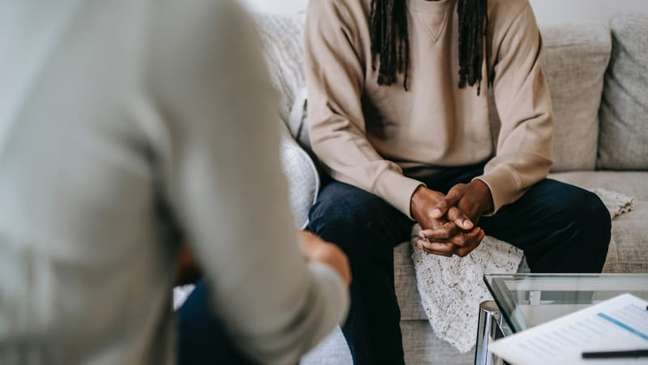Psychological treatment is an ally to prevent and treat possible ailments, many of which are aggravated by the pandemic.

Manaus-based journalist Ariel Bentes, 24, began therapy in her early teens through the Unified Health System (SUS). However, she was forced to stop treatment because she had to move to another city and returned to her sessions last August.
What prompted the journalist to look for a specialist again was the racism she suffered at the company where she worked in 2019. In addition to the trauma she suffered from being a victim of this crime, the overload of work intensified during the phase. more critical than the Covid-19 Pandemic. , it also influenced the decision-making process.
Since he was financially dependent on his job, he says he had to continue in the same position. Shortly thereafter, in 2020, she faced even more difficulties in coping with the collective pain and loss of family members, one of them due to the coronavirus.
“Everything was coming back and this need for psychological follow-up became greater, but it was not possible for economic reasons, I was only able to return to therapy recently,” recalls Bentes.
His aunt Ana Amarante passed away at the age of 62, due to Covid-19, in March 2021, two weeks before starting the vaccination for her age group. Ariel’s account helps illustrate the article produced by the Working Group on Racism and Health of the Brazilian Association of Collective Health (Abrasco). The study found that, around the time of the Covid-19 pandemic, the black population was among the group with the greatest victims of the virus. According to the survey, among the impacts on mental health, this population suffers from fear, anxiety, discouragement, grieving processes and other psychosocial effects resulting from this period.
Strengthening of networks
In the most critical period of the pandemic, before having the opportunity to pay for the sessions with a specialist, Ariel Bentes looked for mechanisms that could help her not to worsen her health conditions. “I have some friends who were already doing counseling at the time, for other reasons. I always talked to some of them, who showed me techniques that normally work with most people,” she says.
In these techniques he saw in the practice of physical exercises a strong ally to circumvent the lack of access to mental health. “I couldn’t leave the house to go to the gym due to the pandemic, but I tried exercising at home,” he says.
Clinical psychologist Clarissa Gomes, 29, a mental health specialist with particular attention to the black population and bereaved patients, points out that the concentration of the black population is higher in the periphery and, therefore, access to mental health is only possible through public policies. efficient and truly intersectional.
“Access to mental health is not guaranteed. On the contrary, it is difficult, it is also complicated for these people to have this access., In the hospital”, explains the psychologist.
“The person also ends up not being adequately addressed to what could solve that symptom, so they remain in this cycle of physical illnesses, with emotional causes, but which are not investigated and often become chronic health problems,” adds Clarissa Gomes.
The specialist reports the existence of a greater predisposition of this population to the development of personality disorders, mood disorders, depression and anxiety caused by social exclusion. “All this greatly increases these risks of emotional illness. These are symptoms that are often not seen. Treatment is only truly effective when we can diagnose”, strengthens the psychologist.
Support networks and public service
Psychosocial care centers (CAPS) and support networks, such as the black movement, family and friends, help the black population cope with the mental health impacts caused by the Covid-19 pandemic.
A good example comes from the north of São Paulo, more precisely from the Brasilândia neighborhood. The KilomBrasa movement promotes the formation of organizations for anti-racist struggles in the practices of the Unified Health System (SUS).
Among the actions developed at CAPS by Brasa, there are psychosocial practices built on racial issues, such as the Time Exchange Fair, which holds discussions on squatter settlements in the SUS based on deepening decolonial and anti-racist studies, exchanging experiences, facilitating health practices, decolonizing culture, as well as blackening public health practices.
Knowledge production as prevention
The production and dissemination of knowledge are also strong allies in prevention, mainly to alert the population to the impacts of everyday racism on the mental health of the black population.
“From everything we see as something bad and wrong, something we have to adapt to, the pursuit of bleaching. The need to spread this knowledge in schools, about the history of the diaspora, of slavery. To be discussed in order to be seen and named the our pain, “emphasizes Clarissa Gomes.
Still on the subject, the specialist points out that there is no way to talk about darkness without mentioning the impacts on mental health and access to a black psychology that can better understand this population, especially after the impacts caused by the Covid pandemic. 19.
“It is a job that a few years ago was much more difficult. Things are moving slowly, but they are steps that we must value and hope that our next generations will not suffer as much as the present one. It is a constant struggle for that to happen.” happen. So that our children and grandchildren can have access that our parents and grandparents did not have, “she concludes.
The pandemic contributes to an increased search for psychological assistance
+The best content in your email for free. Choose your favorite Earth Newsletter. Click here!
Source: Terra
Benjamin Smith is a fashion journalist and author at Gossipify, known for his coverage of the latest fashion trends and industry insights. He writes about clothing, shoes, accessories, and runway shows, providing in-depth analysis and unique perspectives. He’s respected for his ability to spot emerging designers and trends, and for providing practical fashion advice to readers.







